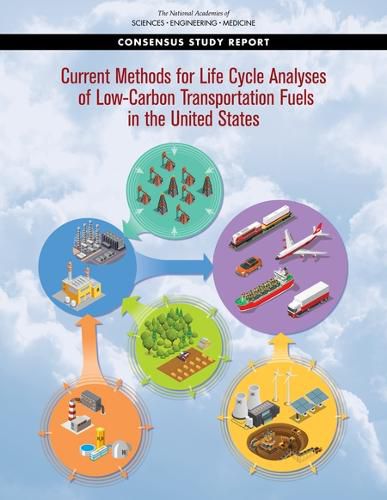Readings Newsletter
Become a Readings Member to make your shopping experience even easier.
Sign in or sign up for free!
You’re not far away from qualifying for FREE standard shipping within Australia
You’ve qualified for FREE standard shipping within Australia
The cart is loading…






Transportation is the largest source of greenhouse gas emissions in the United States, with petroleum accounting for 90 percent of transportation fuels. Policymakers encounter a range of questions as they consider low-carbon fuel standards to reduce emissions, including total emissions released from production to use of a fuel or the potential consequences of a policy. Life-cycle assessment is an essential tool for addressing these questions. This report provides researchers and practitioners with a toolkit for applying life-cycle assessment to estimate greenhouse gas emissions, including identification of the best approach to use for a stated policy goal, how to reduce uncertainty and variability through verification and certification, and the core assumptions that can be applied to various fuel types. Policymakers should still use a tailored approach for each fuel type, given that petroleum-based ground, air, and marine transportation fuels necessitate different considerations than alternative fuels including biofuels, hydrogen, and electricity. Ultimately, life-cycle assessments should clearly document what assumptions and methods are used to ensure transparency.
Table of Contents
Front Matter Summary Part I: Background and Policy Context for Life-Cycle Analysis 1 Introduction and Policy Context 2 Fundamentals of Life-Cycle Assessment 3 Life-Cycle Assessment in a Low-Carbon Fuel Standard Policy Part II: General Considerations for Life-Cycle Analysis 4 Key Considerations: Direct and Indirect Effects, Uncertainty, Variability, and Scale of Production 5 Verification 6 Specific Methodological Issues Relevant to a Low-Carbon Fuel Standard Part III: Specific Fuel Issues for Life-Cycle Analysis 7 Fossil and Gaseous Fuels for Road Transportation 8 Aviation and Maritime Fuels 9 Biofuels 10 Electricity as a Vehicle Fuel Appendix A: Conclusions and Recommendations Appendix B: Committee Members' Biographical Sketches Appendix C: Open Session Agendas
$9.00 standard shipping within Australia
FREE standard shipping within Australia for orders over $100.00
Express & International shipping calculated at checkout
Transportation is the largest source of greenhouse gas emissions in the United States, with petroleum accounting for 90 percent of transportation fuels. Policymakers encounter a range of questions as they consider low-carbon fuel standards to reduce emissions, including total emissions released from production to use of a fuel or the potential consequences of a policy. Life-cycle assessment is an essential tool for addressing these questions. This report provides researchers and practitioners with a toolkit for applying life-cycle assessment to estimate greenhouse gas emissions, including identification of the best approach to use for a stated policy goal, how to reduce uncertainty and variability through verification and certification, and the core assumptions that can be applied to various fuel types. Policymakers should still use a tailored approach for each fuel type, given that petroleum-based ground, air, and marine transportation fuels necessitate different considerations than alternative fuels including biofuels, hydrogen, and electricity. Ultimately, life-cycle assessments should clearly document what assumptions and methods are used to ensure transparency.
Table of Contents
Front Matter Summary Part I: Background and Policy Context for Life-Cycle Analysis 1 Introduction and Policy Context 2 Fundamentals of Life-Cycle Assessment 3 Life-Cycle Assessment in a Low-Carbon Fuel Standard Policy Part II: General Considerations for Life-Cycle Analysis 4 Key Considerations: Direct and Indirect Effects, Uncertainty, Variability, and Scale of Production 5 Verification 6 Specific Methodological Issues Relevant to a Low-Carbon Fuel Standard Part III: Specific Fuel Issues for Life-Cycle Analysis 7 Fossil and Gaseous Fuels for Road Transportation 8 Aviation and Maritime Fuels 9 Biofuels 10 Electricity as a Vehicle Fuel Appendix A: Conclusions and Recommendations Appendix B: Committee Members' Biographical Sketches Appendix C: Open Session Agendas